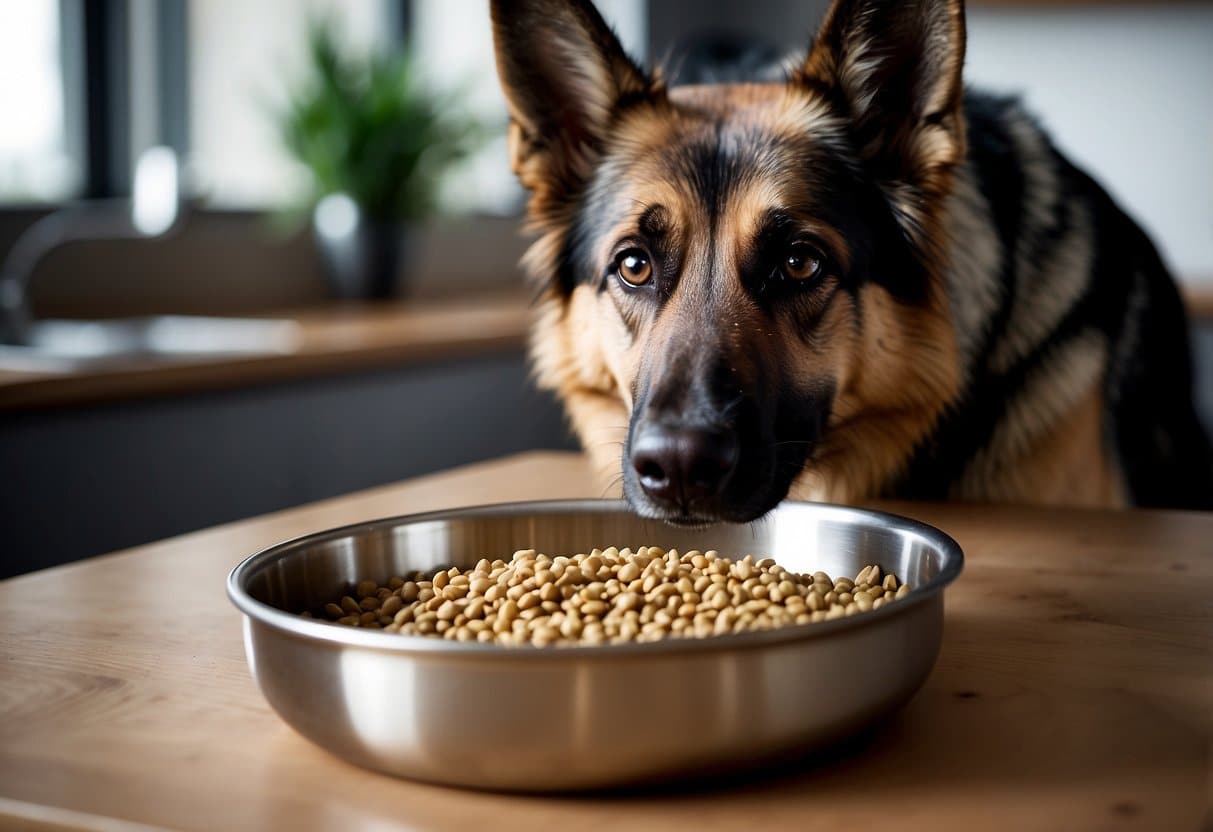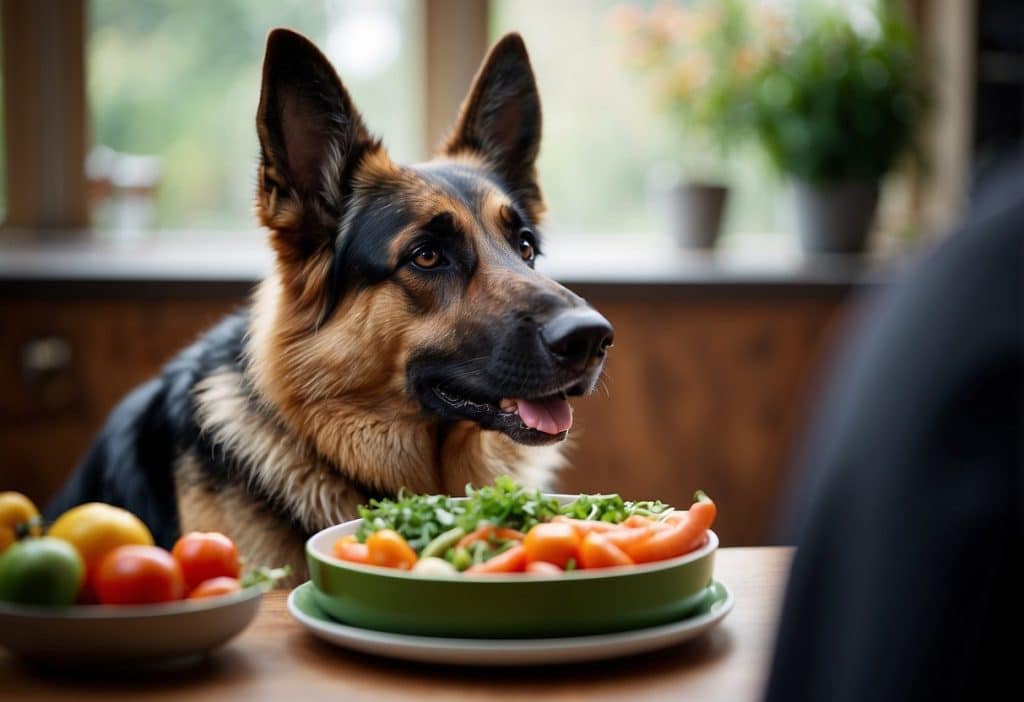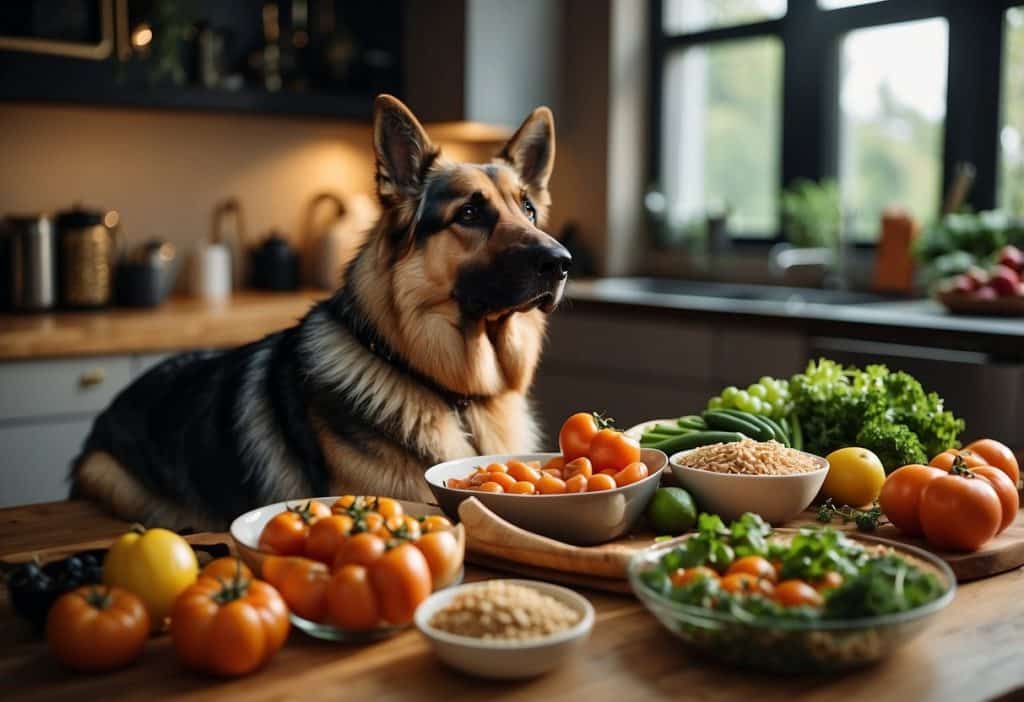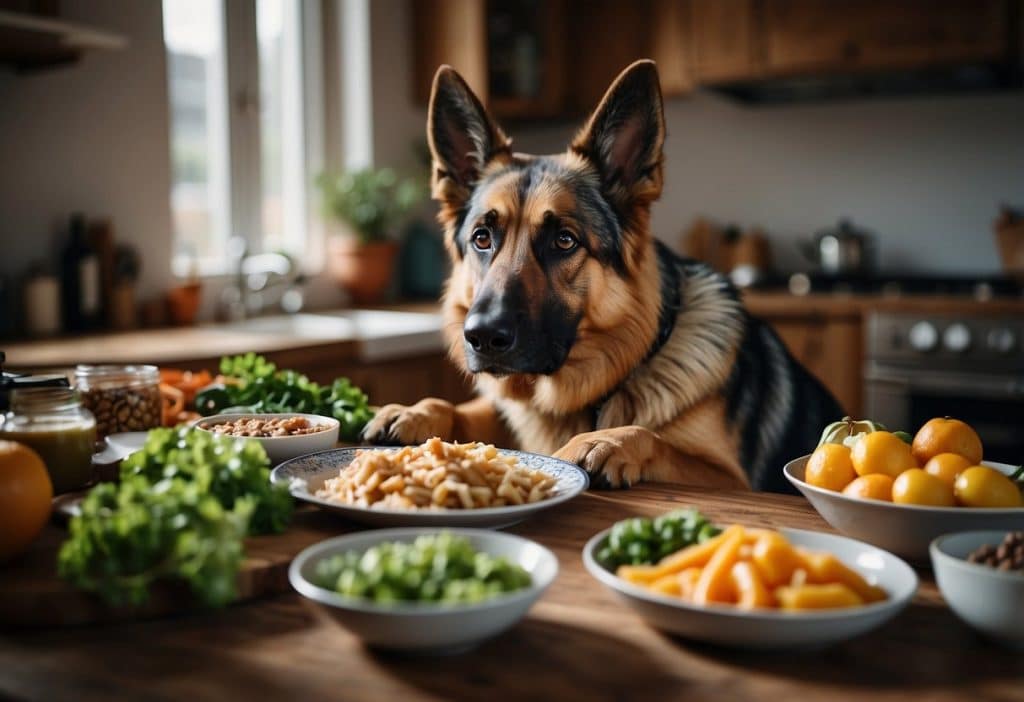
German Shepherds are active, loyal companions that need the right nutrition to stay healthy and happy. Feeding your German Shepherd homemade meals can be a great way to ensure they get the nutrients they need. A balanced homemade diet for German Shepherds should include about 70% protein, 20% vegetables, and 10% carbohydrates.
Making your own dog food lets you control the ingredients and tailor meals to your pet’s needs. You can avoid fillers and preservatives found in some commercial foods. Homemade meals also allow you to adjust portion sizes as your dog grows or ages.
Before starting a homemade diet, talk to your vet about your German Shepherd’s specific nutritional needs. They can help you create meal plans that provide the right balance of nutrients. With some planning, you can make tasty, healthy meals your German Shepherd will love.
Key Takeaways
- Homemade meals give you control over ingredients and portion sizes for your German Shepherd
- A balanced diet should include mostly protein with some vegetables and carbs
- Consult your vet to create meal plans that meet your dog’s nutritional needs
Understanding German Shepherd Nutritional Needs
German Shepherds need a balanced diet to stay healthy and active. The right mix of nutrients helps them grow strong bones, maintain shiny coats, and have plenty of energy.
Protein and Amino Acids
Protein is key for German Shepherds. It helps build and repair muscles, organs, and other body tissues. Your German Shepherd needs about 22.5% protein in their diet. This is higher for puppies and nursing dogs.
Good protein sources include:
- Lean meats (chicken, turkey, beef)
- Fish
- Eggs
Amino acids are the building blocks of protein. Your dog needs a mix of essential amino acids they can’t make on their own. Look for foods with complete proteins that have all the amino acids.
Fats and Fatty Acids
Fats give your German Shepherd energy and help absorb vitamins. They also keep your dog’s skin and coat healthy. Your dog needs both omega-3 and omega-6 fatty acids.
Good fat sources include:
- Fish oil
- Flaxseed
- Chicken fat
Too much fat can lead to weight gain. Keep an eye on your dog’s body condition and adjust their diet as needed.
Carbohydrates and Fiber
Carbs give your German Shepherd quick energy. Fiber helps with digestion. Your dog doesn’t need as many carbs as humans do.
Good carb sources include:
- Sweet potatoes
- Brown rice
- Oatmeal
Fiber can come from veggies like green beans or pumpkin. These also add vitamins and minerals to your dog’s diet.
Vitamins and Minerals
Vitamins and minerals support many body functions in your German Shepherd. They help with everything from bone growth to immune health.
Key vitamins and minerals include:
- Calcium and phosphorus for strong bones
- Vitamin E for skin health
- B vitamins for energy metabolism
You can get these from a mix of meats, veggies, and fruits in your dog’s homemade meals. If you’re not sure your dog is getting enough, talk to your vet about supplements.
Age-Appropriate Diet Plans
German Shepherds have different nutritional needs at each life stage. Proper feeding ensures health, growth, and longevity.
Puppy Nutrition
German Shepherd puppies need high-calorie, protein-rich diets for rapid growth. Feed them 3-4 small meals daily.
Calcium and phosphorus are key for bone development. Aim for a ratio of 1.2:1.
Puppy food should contain:
- 22-24% protein
- 8-9% fat
- DHA for brain development
Adjust portions based on growth rate. A 3-month-old puppy might need 2 cups daily, while a 6-month-old may require 3 cups.
Monitor weight gain. Slow, steady growth prevents joint issues later in life.
Adult Maintenance
Adult German Shepherds need balanced nutrition to maintain muscle mass and energy levels. Feed them 2-4 cups of food daily, split into two meals.
A healthy adult diet includes:
- 18-22% protein
- 5-8% fat
- Fiber for digestion
- Omega fatty acids for coat health
Adjust portions based on activity level. Working dogs may need more calories than house pets.
Choose foods with glucosamine and chondroitin to support joint health. This breed is prone to hip dysplasia.
Senior Health Supports
Older German Shepherds often need fewer calories but more targeted nutrition. Reduce portion sizes to prevent weight gain.
Senior diets should focus on:
- Joint support (glucosamine, chondroitin)
- Digestive aids (probiotics, fiber)
- Antioxidants for cognitive health
- Lower sodium for heart health
Consider soft foods if dental issues arise. Wet food or soaked kibble can be easier to eat.
Monitor protein intake. Seniors need high-quality protein to maintain muscle mass, but too much can stress aging kidneys.
Weight Management
German Shepherds can gain weight easily, leading to health issues. Control portions and choose low-calorie, high-fiber foods for overweight dogs.
For weight loss:
- Cut daily calories by 20-25%
- Increase exercise gradually
- Use a measuring cup for precise portions
- Offer low-calorie treats like carrots
A weight loss diet should still meet nutritional needs. Look for foods with:
- High protein (to maintain muscle)
- Low fat
- Added fiber (for fullness)
Weigh your dog weekly. Aim for 1-2% body weight loss per week. Adjust food amounts as needed to maintain steady progress.
Safe and Healthy Recipe Components

Making homemade food for your German Shepherd requires careful selection of ingredients. The right mix of proteins, fruits, vegetables, fats, and carbohydrates helps keep your dog healthy and strong.
Choosing the Right Proteins
Protein is key for your German Shepherd’s diet. Meat is the main protein source and should make up about 50% of their meal. Good options include:
- Chicken
- Turkey
- Lean beef
- Fish (like salmon or sardines)
Mix muscle meat with small amounts of organ meat for extra nutrients. Eggs are also great, providing high-quality protein and essential fatty acids.
Be careful with raw meat. It can have bacteria that might make your dog sick. If you choose to feed raw, make sure it’s from a trusted source and handle it safely.
Incorporating Fruits and Vegetables
Fruits and veggies give your German Shepherd important vitamins and fiber. Good choices include:
- Carrots
- Sweet potatoes
- Peas
- Green beans
- Apples (without seeds)
- Blueberries
Carrots and sweet potatoes offer essential vitamins and carbs. They’re easy to cook and mix into meals. Peas and beans add protein and fiber.
Don’t overdo fruits due to their sugar content. A small amount is fine as a treat or meal addition.
Balancing Fats and Oils
Fats are crucial for your dog’s energy and coat health. Good fat sources include:
- Fish oil (for omega-3 fatty acids)
- Olive oil (in small amounts)
- Fat from meats
Fish oil is great for skin, coat, and joint health. Use it as a topper on meals. Olive oil can be used sparingly for cooking or as a drizzle.
Be careful not to add too much fat. German Shepherds need some, but too much can lead to weight gain.
Selecting Beneficial Carbohydrates
Carbs give your German Shepherd energy. Good options are:
- Brown rice
- Quinoa
- Sweet potatoes
- Pumpkin
Brown rice is a healthy grain option that’s easy to digest. Quinoa is protein-rich and gluten-free. Sweet potatoes and pumpkin provide fiber and vitamins.
Avoid using fillers like white rice or pasta. They don’t offer much nutrition. Stick to complex carbs that provide more benefits.
Remember to introduce new foods slowly. This helps avoid upset stomachs. Always check with your vet before making big changes to your dog’s diet.
Creating Your German Shepherd’s Meal Plan

Making homemade meals for your German Shepherd can be rewarding and healthy. You’ll need to focus on proper preparation, food safety, and adding the right supplements.
Homemade Meal Preparation
Start by choosing high-quality proteins like lean meats, fish, and eggs. Add vegetables like carrots, green beans, and sweet potatoes for fiber and nutrients. Aim for a mix of 70% protein, 20% vegetables, and 10% grains.
Cook meats thoroughly to kill bacteria. Steam or lightly cook veggies to keep nutrients. Avoid onions, garlic, grapes, and chocolate, which are toxic to dogs.
Portion sizes depend on your dog’s weight and activity level. A basic rule is 2-3% of body weight daily, split into two meals.
Use a food scale for accuracy. Prep meals in bulk and freeze portions for convenience.
Understanding Food Safety
Keep your German Shepherd’s food safe by following these guidelines:
- Wash hands before and after handling ingredients
- Use separate cutting boards for meats and vegetables
- Cook meats to safe internal temperatures
- Refrigerate prepared meals within 2 hours
- Store meals in airtight containers
- Thaw frozen meals in the fridge, not on the counter
Raw diets need extra care. Always buy fresh, human-grade meats. Freeze raw meats for 3 days before use to kill parasites.
Clean food bowls daily with hot, soapy water. Replace plastic bowls yearly to prevent bacteria buildup.
Incorporating Supplements
Even well-planned homemade diets may lack some nutrients. Add these supplements to ensure your German Shepherd gets everything they need:
- Calcium: Essential for strong bones and teeth
- Fish oil: Provides omega-3 fatty acids for skin and coat health
- Vitamin E: Acts as an antioxidant
- Multivitamin: Fills any nutritional gaps
Talk to your vet about specific supplement needs. They may recommend extras based on your dog’s age, health, and activity level.
Add a sprinkle of parsley to meals. It freshens breath and provides vitamins A and C.
Rotate protein sources weekly to provide varied nutrients. This also prevents food boredom and allergies.
Frequently Asked Questions

Many German Shepherd owners have questions about homemade dog food recipes. Let’s look at some common concerns about ingredients, nutrition, and proper meal ratios for your furry friend.
What are some vet-approved homemade dog food recipes for a German Shepherd?
Vet-approved recipes often include a balance of protein, carbohydrates, and vegetables. A simple recipe might combine lean ground beef, brown rice, and mixed vegetables. You can also try chicken with sweet potatoes and green beans.
Always consult your vet before starting a new diet. They may suggest adding supplements to ensure your dog gets all necessary nutrients.
How can I ensure homemade dog food is nutritionally complete for my German Shepherd?
To make sure your homemade meals are balanced, follow recipes designed by veterinary nutritionists. Include a variety of proteins, whole grains, and vegetables. You might need to add vitamin and mineral supplements.
Regular check-ups with your vet can help monitor your dog’s health on a homemade diet. They may recommend blood tests to check for any nutritional deficiencies.
What are considered the best homemade dog food recipes for a German Shepherd?
The best recipes provide a mix of protein, carbs, and healthy fats. A popular option is turkey, rice, and vegetable mix. Another good choice is salmon with quinoa and spinach.
These recipes offer variety and meet your German Shepherd’s nutritional needs. Remember to adjust portion sizes based on your dog’s age, weight, and activity level.
Which ingredients are essential for a healthy German Shepherd diet in homemade food?
Essential ingredients include high-quality proteins like chicken, beef, or fish. Complex carbohydrates such as brown rice or sweet potatoes are important. Include a variety of vegetables for vitamins and minerals.
Healthy fats from sources like fish oil or flaxseed are crucial for coat health. Calcium sources like eggshells or bone meal are necessary for strong bones and teeth.
Which foods should be avoided when making homemade dog food for German Shepherds?
Avoid onions, garlic, grapes, and raisins as they can be toxic to dogs. Don’t use chocolate, caffeine, or alcohol in any recipes. Avoid high-fat meats and remove all bones from meat before cooking.
Stay away from foods with added sugars or artificial sweeteners. Some dogs may have trouble digesting dairy products, so use caution with these ingredients.
What are the recommended food ratios for homemade German Shepherd meals?
A general guideline is 50% protein, 25% vegetables, and 25% grains. Adjust these ratios based on your dog’s specific needs and your vet’s advice. For active German Shepherds, you might increase the protein slightly.
Puppies and pregnant dogs may need different ratios. Always measure ingredients carefully to maintain proper nutrition balance.





